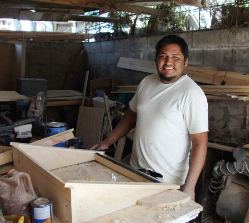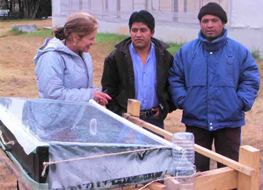The Capacity Building Continuum

|
Science Literacy
The implications of the technological basis of modern society have permeated the entire planet. A basic understanding of science and the technology it has spawned is essential to understanding human and environmental health challenges around the world. Scientifically informed decision making is critical as individuals, communities, organizations, and governments mold environmental, economic, military, transportation, education and public health strategies, policies, and habits.
The lack of core scientific competencies is a fundamental challenge for sustainable development however 1. According a to 1996 National Science Board study, 85- 90% of even the relatively affluent adult population of the United states is effectively scientifically illiterate2.

|
Empowering a Sustainable World
The use and maintenance of appropriate technologies, such as solar distillation, solar disinfection, solar cooking, or bio-gas digesters requires a basic understanding of the technology by users. Construction, diffusion and adaptation of these tools to surrounding communities requires an even deeper level of understanding of the relevant engineering and science by local people.
Beyond science literacy, capacity building is a collaborative pedagogical and organizational approach that rests on and expands the existing human capacity within a community to analyze both local and global problematics and to devise, assess, and implement appropriate sustainable solutions to interconnected challenges.

|
The Capacity Building Continuum
Transcending the conceptual borders between classroom and community, capacity building can be seen more broadly to embrace the full continuum of educative efforts and experience. In addition to supporting work with people locally, the Science for the People website is a tool for any internet capable audience. As one way of organizing useful online information there is a graphical site navigator (see icon at the upper left corner) which provides rapid access to our graphical learning tools , research data , repository of footprint calculators , list of opportunities in citizen science as well as more formal discussions of the state of the biosphere and science pedagogy.
References
1. Science and Technology: Public Attitudes and Understanding, Chapter 7; Science and Engineering Indicators 2004, National Science Board.
2. U.S. Science and Engineering in a Changing World, 1996; National Science Board.